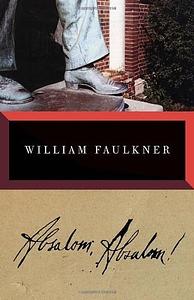Take a photo of a barcode or cover
I don't quite love this 1936 novel, but I can understand why so many people do. It's a layered and complex narrative that demands a close reading, and author William Faulkner's run-on prose is perfectly pitched to capture the slow crumbling of its central family, their manor house, and the more general antebellum way of life. That deterioration is the sign of a true southern gothic, and although the exact chain of events isn't completely clear to me after an initial sifting through of its various unreliable narrators, the sweltering tone of this tragedy is certainly one that lingers.
[Major content warning for nineteenth-century racism and sexism and the frequent use of the n-word even by ostensibly more enlightened characters.]
[Major content warning for nineteenth-century racism and sexism and the frequent use of the n-word even by ostensibly more enlightened characters.]
challenging
dark
mysterious
sad
slow-paced
Plot or Character Driven:
Plot
Strong character development:
No
Loveable characters:
No
Diverse cast of characters:
No
Flaws of characters a main focus:
Yes
Beautifully written but despite the intentional repetition of the story, I really didn't care for the story itself, even as new details are revealed with each retelling. It does, however, show the nature of mythologising, how stories change depending on who tells it and how they tell it.
4.5
Gag! Kind of left me mind-boggled (the usual Faulkner vibe). The second half thrust so much information at me that I was scrambling to keep up with Faulkner basically burning Southern history to the ground. So much anger. This novel feels furious. But there's also so much care for oral storytelling as both a challenge to any possibility of objectivity and a reclamation of the subjective as an extremely powerful force with which to attempt bridging the gap between the internal and external, the personal and political. When speaking from memory, whether it be one's own or intergenerationally passed down, everybody believes they are telling the truth while lying and lying while telling the truth. Makes the read a bit frustrating, but, like with seemingly all of the novels of his I've read thus far, you just have to trust that Faulkner will eventually lead into the light, at least just a little bit.
Faulkner is a central American mythmaker. He writes with biblical grandiosity and his characters maintain their complex idiosyncracies while becoming archetypal figures of the failed American project of opportunism and liberation's coexistence. History is constantly repeating itself. Yet it feels less like history is alive, and more that the present is dead.
Gag! Kind of left me mind-boggled (the usual Faulkner vibe). The second half thrust so much information at me that I was scrambling to keep up with Faulkner basically burning Southern history to the ground. So much anger. This novel feels furious. But there's also so much care for oral storytelling as both a challenge to any possibility of objectivity and a reclamation of the subjective as an extremely powerful force with which to attempt bridging the gap between the internal and external, the personal and political. When speaking from memory, whether it be one's own or intergenerationally passed down, everybody believes they are telling the truth while lying and lying while telling the truth. Makes the read a bit frustrating, but, like with seemingly all of the novels of his I've read thus far, you just have to trust that Faulkner will eventually lead into the light, at least just a little bit.
Faulkner is a central American mythmaker. He writes with biblical grandiosity and his characters maintain their complex idiosyncracies while becoming archetypal figures of the failed American project of opportunism and liberation's coexistence. History is constantly repeating itself. Yet it feels less like history is alive, and more that the present is dead.
challenging
dark
emotional
reflective
sad
medium-paced
Plot or Character Driven:
A mix
Strong character development:
No
Loveable characters:
No
Diverse cast of characters:
Complicated
Flaws of characters a main focus:
Yes
It was definitely more difficult than the other Faulkner I've read, As I Lay Dying. However, it was so very interesting, and I quite enjoyed it! I would definitely recommend this book, as it gave unique perspectives on the various characters.
თუ ოდესმე მიაღწიე ბოლო გვერდს, გზაში რამდენიც არ უნდა წყევლო წერის სტილი, მაინც მოგინდება თავიდან დაწყება და მილიონი გამორჩენილი დეტალიდან კიდევ ერთი-ორის გამოგლეჯვა ბატონი უილიამის მაგრად შეკრული მუშტებიდან.
challenging
dark
challenging
dark
slow-paced
Plot or Character Driven:
Character
Strong character development:
Complicated
Loveable characters:
No
Diverse cast of characters:
Yes
Flaws of characters a main focus:
Yes
'Interviewer: So, people say they can't understand your writing, even after they read it two or three times. What approach would you suggest for them?
Faulkner: Read it four times.'
I became a fan of Faulkner’s after starting and finishing [b:As I Lay Dying|77013|As I Lay Dying|William Faulkner|https://i.gr-assets.com/images/S/compressed.photo.goodreads.com/books/1451810782l/77013._SY75_.jpg|481854] in one long car journey last year. I remember really enjoying it and feeling so immersed in his cinematic, poetic Southern gothic world full of rich imagery, well written characters, and confusing but fast-paced storytelling. This book did have similar components, but it was much less digestible and felt quite dragged out.
That said, there were moments when the writing did intrigue me. The structure was also quite interesting, using a lot of different characters' perspectives to retell the same story. But overall, for me, it was just so confusing! [b:One Hundred Years of Solitude|320|One Hundred Years of Solitude|Gabriel García Márquez|https://i.gr-assets.com/images/S/compressed.photo.goodreads.com/books/1327881361l/320._SX50_.jpg|3295655] kind of confusing. I’m sure it would have been possible for me to understand it fully with more focus and dedication but really the characters and plot didn’t intrigue me enough.
There were moments where I wanted to understand it better, and for that reason I am sure I will try to re-read the book at some point. But for now, I am glad to have finished it…
Faulkner: Read it four times.'
I became a fan of Faulkner’s after starting and finishing [b:As I Lay Dying|77013|As I Lay Dying|William Faulkner|https://i.gr-assets.com/images/S/compressed.photo.goodreads.com/books/1451810782l/77013._SY75_.jpg|481854] in one long car journey last year. I remember really enjoying it and feeling so immersed in his cinematic, poetic Southern gothic world full of rich imagery, well written characters, and confusing but fast-paced storytelling. This book did have similar components, but it was much less digestible and felt quite dragged out.
That said, there were moments when the writing did intrigue me. The structure was also quite interesting, using a lot of different characters' perspectives to retell the same story. But overall, for me, it was just so confusing! [b:One Hundred Years of Solitude|320|One Hundred Years of Solitude|Gabriel García Márquez|https://i.gr-assets.com/images/S/compressed.photo.goodreads.com/books/1327881361l/320._SX50_.jpg|3295655] kind of confusing. I’m sure it would have been possible for me to understand it fully with more focus and dedication but really the characters and plot didn’t intrigue me enough.
There were moments where I wanted to understand it better, and for that reason I am sure I will try to re-read the book at some point. But for now, I am glad to have finished it…
I was reading it for a class and it got to a point where my brain was just mush. It's a really challenging read.




